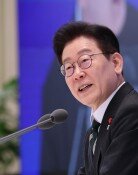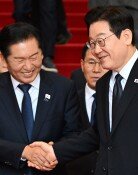100-year war between Park Chung-hee and Kim Il Sung
100-year war between Park Chung-hee and Kim Il Sung
Posted February. 22, 2014 08:03,
Kim Il Sung, the late founder and former leader of North Korea, was born in 1912, while Park Chung-hee, who served as a South Korean president for nearly 20 years, was born in 1917. Just before the 100th year of Kim`s birth, his son and successor Kim Jong Il ended his life of absolute power, and his grandson Kim Jong Un began the third-generation power succession. In February 2018, the year following the centennial of Park Chung-hee`s birth, his daughter Park Geun-hye will retire from her presidency in South Korea. It is a weird coincidence, although power was succeeded through a monarchal inheritance in the North and through a democratic election in the South. The legacies of Park Chung-hee and Kim Il Sung are still going on.
Kim Il Sung was off to a far more favorable political start. A anti-Japanese fighter during Japan`s colonial rule of Korea, Kim rose to supreme power in the North at the age of 33 with Stalin`s backing. Park, who took power after his 1961 military coup, was no match for Kim in cause because of the former`s career as a junior officer for the Imperial Japanese Army. In the 1960s, the North Korean economy overwhelmed that of the South.
However, the performances and evaluations of their leaderships after their coffins were closed brought a great reversal. South Korea, once one of the poorest countries in the world, achieved an economic miracle while going through the Park Chung-hee period. Although the economic achievements were made at the expense of freedom and human rights, the growth of the middle class following the successful industrialization provided the basis for the democratization in 1987, eight years after his death. By contrast, North Korea under the tyranny of the Kim Il Sung family has fallen into a land of death.
These days, few in the international community view the Kim family`s rule positively. The North`s Yodok concentration camp is considered a symbol of horrible human rights abuse worse than Nazi Germany`s Auschwitz. The United Nations Commission of Inquiry on Human Rights in the Democratic People`s Republic of Korea (North Korea) has accused the Kim family of their crimes against humanity. Even though millions of North Korean people were starved or frozen to death or killed by tyranny, the Kim family has been enjoying extremely luxurious life, channeling billions of dollars in secret funds overseas.
Ezra Vogel, professor of the social sciences emeritus at Harvard University, said that Park Chung-hee was a leader who devoted his life to the country and that if South Korea had lost the opportunity, its industrialization would have been difficult to achieve. William Overholt, a China specialist in the United States, also said that today`s South Korea would have been impossible without Park. He asserts that Kim Il Sung, the late founder and former leader of North Korea, was born in 1912, while Park Chung-hee, who served as a South Korean president for nearly 20 years, was born in 1917. Just before the 100th year of Kim`s birth, his son and successor Kim Jong Il ended his life of absolute power, and his grandson Kim Jong Un began the third-generation power succession. In February 2018, the year following the centennial of Park Chung-hee`s birth, his daughter Park Geun-hye will retire from her presidency in South Korea. It is a weird coincidence, although power was succeeded through a monarchal inheritance in the North and through a democratic election in the South. The legacies of Park Chung-hee and Kim Il Sung are still going on.
Kim Il Sung was off to a far more favorable political start. A anti-Japanese fighter during Japan`s colonial rule of Korea, Kim rose to supreme power in the North at the age of 33 with Stalin`s backing. Park, who took power after his 1961 military coup, was no match for Kim in cause because of the former`s career as a junior officer for the Imperial Japanese Army. In the 1960s, the North Korean economy overwhelmed that of the South.
However, the performances and evaluations of their leaderships after their coffins were closed brought a great reversal. South Korea, once one of the poorest countries in the world, achieved an economic miracle while going through the Park Chung-hee period. Although the economic achievements were made at the expense of freedom and human rights, the growth of the middle class following the successful industrialization provided the basis for the democratization in 1987, eight years after his death. By contrast, North Korea under the tyranny of the Kim Il Sung family has fallen into a land of death.
These days, few in the international community view the Kim family`s rule positively. The North`s Yodok concentration camp is considered a symbol of horrible human rights abuse worse than Nazi Germany`s Auschwitz. The United Nations Commission of Inquiry on Human Rights in the Democratic People`s Republic of Korea (North Korea) has accused the Kim family of their crimes against humanity. Even though millions of North Korean people were starved or frozen to death or killed by tyranny, the Kim family has been enjoying extremely luxurious life, channeling billions of dollars in secret funds overseas.
Ezra Vogel, professor of the social sciences emeritus at Harvard University, said that Park Chung-hee was a leader who devoted his life to the country and that if South Korea had lost the opportunity, its industrialization would have been difficult to achieve. William Overholt, a China specialist in the United States, also said that today`s South Korea would have been impossible without Park. He asserts that Deng Xiaoping`s strategy for modernizing China was modeled after the Park`s. The two scholars had been critical of Park in the past. Many South Koreans who lived through the Park era and hated him when young have shifted their views about his performances.
It is a childish perception reflecting ignorance about the world`s trend that the South Korean economy would have grown this much even without Park. One is free to believe so. However, it is unacceptable that some forces are showing a dangerous attitude of pouring all the curses in the world onto Park while remaining silent about or even defending the Kim family`s tyranny that must be gotten rid of in all aspects including economy, welfare, freedom, human rights and freedom of speech. A typical case is Lee Seok-ki, whom a local court has sentenced to 12 years in prison for plotting an insurrection in support of North Korea and violating the National Security Law.
It seems that the "100-year war" between Park Chung-hee and Kim Il Sung is nearing an end. As long as South Korea does not choose the path of collective self-destruction, the competition has been concluded. When will the day come when South Korea inherits positive legacies of "Park Chung-hee`s country" and remedies its weaknesses and join hands of North Koreans who lived through hell in "Kim Il Sung`s country" to set out on a long journey of a reunified Korea?
`s strategy for modernizing China was modeled after the Park`s. The two scholars had been critical of Park in the past. Many South Koreans who lived through the Park era and hated him when young have shifted their views about his performances.
It is a childish perception reflecting ignorance about the world`s trend that the South Korean economy would have grown this much even without Park. One is free to believe so. However, it is unacceptable that some forces are showing a dangerous attitude of pouring all the curses in the world onto Park while remaining silent about or even defending the Kim family`s tyranny that must be gotten rid of in all aspects including economy, welfare, freedom, human rights and freedom of speech. A typical case is Lee Seok-ki, whom a local court has sentenced to 12 years in prison for plotting an insurrection in support of North Korea and violating the National Security Law.
It seems that the "100-year war" between Park Chung-hee and Kim Il Sung is nearing an end. As long as South Korea does not choose the path of collective self-destruction, the competition has been concluded. When will the day come when South Korea inherits positive legacies of "Park Chung-hee`s country" and remedies its weaknesses and join hands of North Koreans who lived through hell in "Kim Il Sung`s country" to set out on a long journey of a reunified Korea?




![[속보]법원 “12·3 계엄은 내란…한덕수, 절차적 요건 갖추게 해”](https://dimg.donga.com/c/138/175/90/1/wps/NEWS/IMAGE/2026/01/21/133201789.1.jpg)

![‘50만원짜리 김밥’ 알고보니…환불 반복에 자영업자 폭발했다[e글e글]](https://dimg.donga.com/c/138/175/90/1/wps/NEWS/IMAGE/2026/01/21/133200737.3.jpg)
